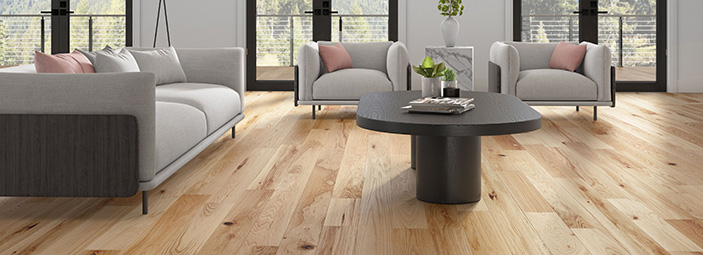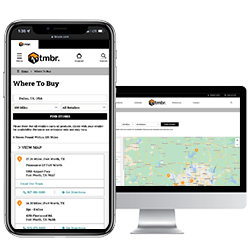Comparing Carpet vs. Hardwood – A Homeonwer’s Guide
March 15, 2024 | By tmbr® Product Expert

Choosing the right flooring for your home can be a daunting task. First, there are numerous options, such as hardwood, carpeting, luxury vinyl, ceramic tile, and laminate.
Second, sorting that list requires considering numerous factors. Indeed, a Google search for “factors to consider when choosing flooring” yields 24 items. That’s a lot to sort through, even though each may weigh into your decision when considering a hardwood floor vs. carpet.
7 Factors to Consider with Carpet vs. Hardwood
Let’s come up with a more manageable number of factors. Seven is typically a popular number for lists. So, we’ll examine seven factors when comparing carpet versus hardwood.
1. Carpet vs. Hardwood Cost
When considering cost, you can quickly compare carpet and hardwood material costs and find the better carpet.
Bob Villa says carpeting costs $2 to $7 per square foot. Those costs apply to synthetic carpeting.
However, consider that high-quality carpeting can cost as much as $20 per square foot. For example, sisal, wool, and luxury wool carpets can be as much as $20 per square foot.
Depending on the type of wood flooring, Forbes presents costs ranging from as little as $3 per square foot to as much as $15 per square foot:
Engineered Hardwood: $3 – $11
Solid Hardwood: $8 – $15
Prefinished Hardwood: $3 – $10
So when you ask what’s cheaper, hardwood floors or carpet, the answer isn’t necessarily clear cut. Still, if your budget is tight, carpet may be the more accessible solution at an average cost of $2.50 (Forbes).
Cost of Installing Hardwood Floors vs Carpet
The advantage goes to carpet for installation. Citing Bob Villa again, he places the average carpet installation costs at no more than $1 per square foot. Compare that to installing hardwood flooring at $3 to $5 per square foot.
As a result, a 16 x 20 room will cost $320 for carpet installation. Wood floor installation could cost as much as $1,600 unless you have the DIY skills.
If you ask whether carpet or hardwood is cheaper, the answer favors carpet when considering installation costs. But if cost is a concern, you should also consider the long-term cost when comparing the two. Here, hardwood has a decided advantage over carpet.
2. Durability – Wood Floors Last Much Longer Than Carpets
Most sources indicate that an average warranty for carpeting is ten years. So, you’ll want to avoid using it in high-traffic areas. Carpeting is ideal in bedrooms where it doesn’t face rigorous wear. Instead, you can enjoy one of its substantial benefits: comfort.
That warranty pales in comparison to wood flooring. For example, companies like TMBR® warrant their engineered hardwoods for 50 years, and some manufacturers include a lifetime warranty on their wood floors.
Looking at those numbers, you could replace carpet five times vs. a wood floor. You must also consider that you can sand and refinish many solid and engineered hardwood floors. It’s perfectly reasonable to install a wood floor once and have it last a lifetime.
During that same timeframe, you’ll install carpeting numerous times, likely paying more overall for carpeting than wood.
Foot Traffic – Hardwoods Handle Everyday Wear and Tear More Than Carpet
If you have an active household, hardwood floors give you more flexibility. You can install them in the areas with the highest traffic and with fewer concerns. Hardwoods can handle hallways, family, living, and dining rooms.
Carpeting works best in bedrooms with less foot traffic concerns. From a safety perspective, it can also be a plus in playrooms. Because carpeting generally includes padding, it’s more forgiving if your children fall.
3. Water Resistance
If water is a concern, you might want to consider another flooring option. The reality is that carpeting and hardwood floors have some water resistance.
You spill water on carpeting, wipe it up, and have little concern. Synthetic fibers dry quickly. But you do need to worry about prolonged exposure to moisture.
The carpet itself may not show any signs of a problem. But you must consider what’s going on underneath it, as mold could begin to grow in the underlayment.
Solid wood floors can’t handle consistent exposure to moisture. The more moisture, the more likely you’ll see the floors warp. Engineered hardwoods have some level of water resistance, enough to install in a basement.
But even engineered wood floors can warp with too much water exposure.
4. Appearance – Hardwood Outshines Carpet
You can’t deny that carpeting is cozy. Walk barefoot on carpeting, and you can feel its plushness. You’ll also avoid the shock of hitting a cold wood floor when crawling out of bed in the morning in winter.
Plus, there’s no shortage of looks allowing you to add style and charm to a room.
Still, carpeting lacks the panache of wood flooring. Wood flooring delivers a richness, shine, and quality that carpeting can’t match. And if you don’t like the feel of a cold floor, a few area rugs in strategic locations remove that worry.
Hardwood flooring is natural, connecting you to the past. A home with hardwoods in every room creates a welcoming environment. Carpeting can’t make a similar statement in a home.
5. Carpet vs. Hardwood Resale Value
You can install new carpeting to improve a room’s look and make your home more sellable. But carpeting isn’t the investment that hardwood flooring is. Realtor.com places the return on investment (ROI) for carpeting at 25% to 40%.
Hardwood flooring easily doubles that ROI, achieving a return of 70% to 80%. Moreover, it can boost your home’s sales price by up to 2.5%.
Builder Online supports those claims. It cites a survey by the National Wood Flooring Association (NWFA) that supports those claims. The survey found that 66% of those surveyed felt wood flooring adds value to a home. Moreover, that same number said wood flooring is what they would choose for their dream home.

6. Maintenance
You can use a vacuum cleaner to maintain both floors, but the hard surface of the wood gives it an advantage. That hard surface helps ward off nasty allergens that carpet can trap. And the issue becomes more problematic over time.
No matter how often you go over the area, a vacuum cleaner can’t lift deeply embedded dirt and dust. With more wear, the deeper those items get and the more challenging it becomes to get a deep cleaning. You’ll need to hire a cleaning service to steam clean carpeting.
With hardwoods, you can see the vacuum lift surface debris. For a deeper clean, you can use hardwood flooring cleaners several times a month.
The bottom line is that carpeting will get so dirty that you’re better off replacing it. Remember, ten years is a good barometer for carpeting. With quality wood flooring, a hundred years can become the barometer.
7. Sustainability
As an eco-friendly flooring option, wood is a better alternative than carpet.
You can recycle most carpeting, but it’s not a simple process. As a result, four billion pounds of carpet end up in U.S. landfills each year (Aquafil). Considering that carpeting’s lifespan is 10-15 years, it creates a lot of opportunity for an endless stream of carpet waste.
Moreover, nylon, used in roughly 65% of carpets, doesn’t biodegrade. Conversely, hardwood flooring is biodegradable. So, even if it winds up in a landfill, it will break down over time.
Wood is also a renewable resource. Sustainable forest management organizations like the Forest Stewardship Council (FSC) ensure sustainable harvesting practices.
Is Hardwood Better Than Carpet?
We often find ourselves trying to determine whether one solution is better. Ultimately, the answer comes down to the factors involved in your assessment. And that’s no different from the carpet vs. wood floors conundrum.
Both of their place in a home. If cost is your number one criterion, carpet may have the edge. If durability is your benchmark, hardwood bests carpet.
If you like to make a bold statement, hardwoods are for you. But carpet has its place if you prefer walking on a warm, comfortable surface.
TMBR® specializes in engineered hardwoods inspired by nature. Choose from hickory, maple, and white oak flooring in widths up to 7 1/2 inches. And enjoy a 50-year warranty for an investment.
Find a TMBR dealer near you using our store locator or call 1.866.243.2726.

Ready to shop for tmbr® flooring near you?
Use our retail locator to find where you can buy tmbr® engineered flooring products.
Find a Store